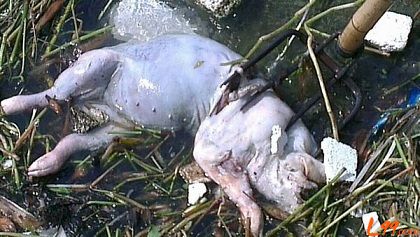Panic over dead pigs prompts satire
The rotting bodies of nearly 6,000 pigs in a river that provides 22 percent of Shanghai's tap water has sparked panic as well as satire among Chinese people.
 |
|
Nearly 6,000 dead pigs had been pulled out of a section of the Huangpu River in Shanghai as of Tuesday. |
A total of 5,916 dead pigs had been fished out from Huangpu River as of Wednesday afternoon, the Shanghai Municipal Government's press office said.
Despite authorities' claims that the river water was not contaminated and Shanghai's tap water was safe, laboratory tests found porcine circovirus in one water sample. The virus can spread among pigs though not to human beings.
Public reaction toward the scandal has turned from panic and anger to satire during the past week. While studious Shanghai residents carried out their own water quality tests and posted results online to show tap water was dirty and unsafe, many others joked about the scandal.
"Life is happy in Shanghai: we simply turn on the faucet and oops, here comes fresh pork soup," read a posting on the web. It has been forwarded so many times that it is impossible to locate the author.
Web users described the dead pig scandal as "Life of Pig." An anonymous netizen even photoshoped the poster of Ang Lee's Oscar-winning "Life of Pi" by adding dozens of pig carcasses in and around Pi's lifeboat.
The source of the dead pigs remained a mystery until a hog farm in Jiaxing City in neighboring Zhejiang Province, confessed Wednesday to dumping carcasses into the Huangpu River.
Though Jiaxing was widely suspected to be the source of the dead animals and local media reports said at least 20,000 pigs died of a sudden illness earlier this year, the city government was steadfast until Tuesday that the dead pigs could not be traced to Jiaxing and no swine epidemic had been reported there.
Jiaxing authorities said 70,000 pigs died this year from abrupt changes of farming techniques and climate conditions, but insisted there had been no swine epidemic breakout.
Coincidentally, on Wednesday, a court in Wenling city, also in Zhejiang, sentenced 46 people to jail terms ranging from six months to six-and-a-half years for processing and selling pork from diseased pigs from 2010 to 2012.
In Wenling's pork safety campaign, beginning in April last year, authorities seized more than 6,000 kg of pork products that tested positive for various viruses.
Some meat processing companies are notorious for producing ham, bacon and sausages with pork from diseased pigs. "We should be happy they dumped the dead pigs into the river instead of putting the meat on our table," a Shanghai resident with the screen name of "max0820" said in a posting on weibo.com.
"Dead pig" was among the top three most searched words or phrases at the Twitter-like microblogging service this week.

